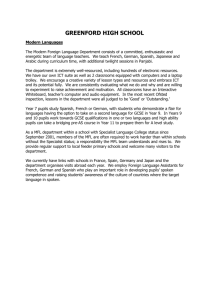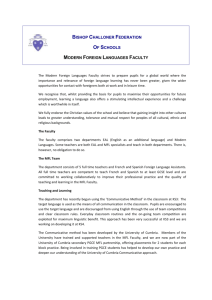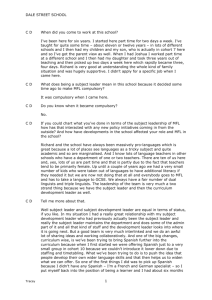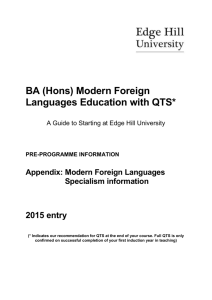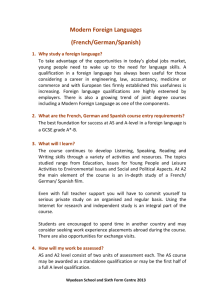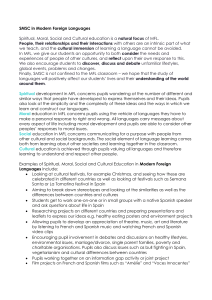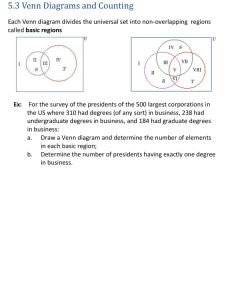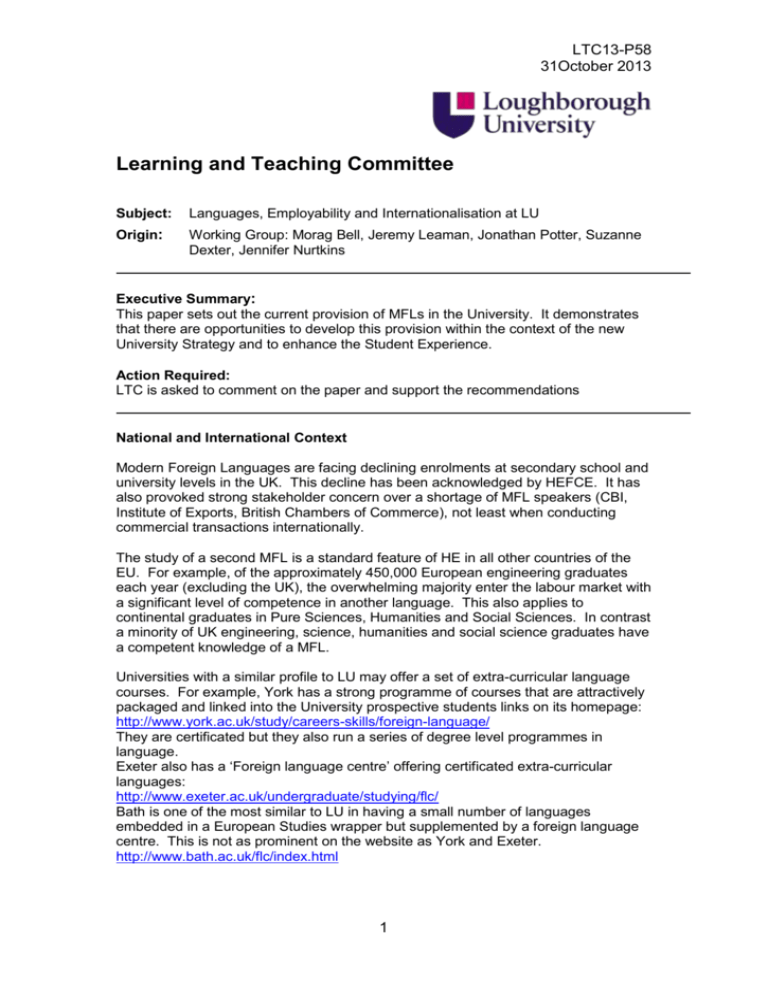
LTC13-P58
31October 2013
Learning and Teaching Committee
Subject:
Languages, Employability and Internationalisation at LU
Origin:
Working Group: Morag Bell, Jeremy Leaman, Jonathan Potter, Suzanne
Dexter, Jennifer Nurtkins
Executive Summary:
This paper sets out the current provision of MFLs in the University. It demonstrates
that there are opportunities to develop this provision within the context of the new
University Strategy and to enhance the Student Experience.
Action Required:
LTC is asked to comment on the paper and support the recommendations
National and International Context
Modern Foreign Languages are facing declining enrolments at secondary school and
university levels in the UK. This decline has been acknowledged by HEFCE. It has
also provoked strong stakeholder concern over a shortage of MFL speakers (CBI,
Institute of Exports, British Chambers of Commerce), not least when conducting
commercial transactions internationally.
The study of a second MFL is a standard feature of HE in all other countries of the
EU. For example, of the approximately 450,000 European engineering graduates
each year (excluding the UK), the overwhelming majority enter the labour market with
a significant level of competence in another language. This also applies to
continental graduates in Pure Sciences, Humanities and Social Sciences. In contrast
a minority of UK engineering, science, humanities and social science graduates have
a competent knowledge of a MFL.
Universities with a similar profile to LU may offer a set of extra-curricular language
courses. For example, York has a strong programme of courses that are attractively
packaged and linked into the University prospective students links on its homepage:
http://www.york.ac.uk/study/careers-skills/foreign-language/
They are certificated but they also run a series of degree level programmes in
language.
Exeter also has a ‘Foreign language centre’ offering certificated extra-curricular
languages:
http://www.exeter.ac.uk/undergraduate/studying/flc/
Bath is one of the most similar to LU in having a small number of languages
embedded in a European Studies wrapper but supplemented by a foreign language
centre. This is not as prominent on the website as York and Exeter.
http://www.bath.ac.uk/flc/index.html
1
LTC13-P58
31October 2013
Current provision at LU
LU was a pioneer in Languages with its influential European Studies programme in
the 1970s and 1980s that was taught entirely in the foreign languages. Other HE
institutions copied the model. However, demand declined in the 1990s and
European Studies was transformed to keep up with changing student interests. This
declining demand has continued and is shared by many HE institutions, probably as
a consequence of a decline in MFLs as core elements of secondary school curricula.
Current provision at LU is limited to the (credit-bearing) University-Wide Language
Programme, and the extra-curricular evening classes.
UWLP
The UWLP covers 12 levels (one level per semester) with ab initio (1-6), GCSE (3-8),
AS (5-10) and A-Level (7-12) Entry. A minority of programmes allow progression
within the UWLP through four or six semesters. Many provide timetable space for
just one semester of a MFL, the pedagogic value of which is limited. When MFL is
provided as a timetable option, it is frequently competing with attractive and closely
programme related option modules.
Annual Registrations for UWLP have declined from 725 in 2009-10 to 709 in 201213, giving a student load of 50.5. The tapering effect of non-progression within UG
programmes is evident in Table 1. This affects above all the higher levels, i.e. those
at which MFL ‘competence’ is acquired. Some -153 (i.e. 22%) of the registrations are
for Levels 7-12.
Extra-Mural Programme
The Extra-Mural Programme has had on average around 700 registrations annually
over the last five/six years. The majority of these registrations are for lower level (16) modules. It should be noted that extra ‘low-level’ modules are made available in
Semester Two for Schools/Departments whose programmes only have timetable
space in one Semester. This level of registrations means that higher level modules
in some less popular languages are sometimes cancelled if they do not reach the
minimum of six registering. The income from registrations was £42,588 in 2012-13
and the cost of providing the service was £67,288.
Staffing
Currently, most of UWLP and Extra-Curricular teaching is delivered by hourly paid,
part-time staff on Bought-in Teacher contracts. A colleague on a 0.6 contract
administers the UWLP. A colleague on a temporary fixed term 0.5 contract
administers the Language Centre and Extra-Curricular programme.
Student interest
A survey of current Loughborough undergraduates from March 2013 revealed
considerable potential demand for enhanced provision of MFL, greater scope for
progression in current programmes and the acquisition of much improved
competence. These claims are, however, somewhat at odds with the registrations on
the extra mural programme which is open to all.
Strategic importance of MFL at LU
Key findings from a range of research demonstrate that MFL knowledge improves
both employability and earnings. (For example, a HEFCE report on ‘Graduates and
2
LTC13-P58
31October 2013
their early careers’1 showed that, three and a half years after graduating, languages
graduates have the highest average salary of all graduates.)
Currently, LU’s focuses its internationalisation strategy on attracting incoming
international students; on promoting outward mobility of UK-based students through
student exchanges and international placement opportunities; on international
research collaboration; on the development of articulation agreements and some
teaching exchanges.
LU has student exchanges with several other European institutions, but there
remains a significant imbalance between incoming and outgoing students. Only in
PHIR do large numbers of students study abroad, largely because of the link with
MFL-acquisition. There would be scope to enhance the international mobility of our
own undergraduates if there were greater opportunities for students to develop their
language competence. (A recent study by psychologists in Jena underscored the
added value for personal development of international mobility.2)
Recommendations
Currently resources are mainly deployed to provide one or two semesters’ worth of
MFL within the UWLP or to support beginners’ modules. This does not realise the
full advantages for student employability of serious MFL acquisition and achieving
solid levels of MFL competence at intermediate and advanced level.
Within the context of the new University Strategy there are compelling reasons to
develop a complementary strategic approach to the provision of MFLs that supports
MFL opportunities not only at the lower levels of provision but also at the higher
levels, where there is significant ‘added value’ for students and an enhanced Student
Experience.
Such a strategy could be linked to other language provision within the University and
to the opportunities that are offered in a range of locations on campus to enhance
students’ cross-cultural awareness.
A strategic approach of this kind requires:
Short-term actions
Increasing the visibility of MFL in University brochures and the website;
Increasing the awareness among University staff a) of the availability of MFL,
b) of its advantages
Assessing the desirability of retaining UWLP-eligibility in the case of
programmes that offer only one semester’s worth of a language option
Providing support to the School for the notable cost of running extra-curricular
programmes to students, staff and the broader Loughborough community.
Actions for the longer term
1
2
The formation of a Working Group, tasked with establishing a centrally funded
autonomous Language Centre, incorporating both MFL-provision and English
as a foreign language, appropriately staffed. This would sit outside of the
http://www.hefce.ac.uk/pubs/year/2008/200839/
https://www.uni-jena.de/Mitteilungen/PM130703_Zimmermann.html
3
LTC13-P58
31October 2013
School of SPG and be placed in Student Services. It would benefit from an
external consultant with experience of University language provision. It would
need to consider the pattern and nature of staffing and how far it should move
away from MFL with modular credit within programmes. It would consider the
requirements for updated facilities and pedagogic spaces. The Working
Group would take on the single task of suggesting how language teaching at
LU should be delivered and situated. It should complete work by the end of
January with the idea that new organizations and spaces could be in place for
October 2014.
The potential for a Centre of this kind generating enterprise income through
cost-plus recreational language courses, including revision courses for
GCSE/ AS and A2 school pupils, and intensive ‘Languages for Special
Purposes’ courses could be explored.
Date – September 2013
Copyright (c) Loughborough University. All rights reserved.
Table1 UWLP Registrations 2012-13
Semester 1
French 1
French 3
French 4
French 5
French 7
French 9
French 11
French 1
French 2
22 German
1
35 German
2
2 German
3
15 German
4
19 German
5
12 German
7
8 German
9
German
11
19 German
1
18 German
2
18 Spanish
1
5 Spanish
3
17 Spanish
5
1 Spanish
7
5 Spanish
9
8 Spanish
11
3
53 Chinese
A
33 Chinese
C
13 Chinese
E
10
20
10
11
10
5
4
17 Spanish
1
14 Spanish
2
4
Semester 2
27 Chinese
20
B
47 Chinese
10
D
LTC13-P58
31October 2013
French 3
French 4
French 6
French 8
French 10
French 12
Total French
20 German
3
23 German
4
13 German
6
18 German
8
10 German
10
6 German
12
240 Total
German
5 Spanish
4
12 Spanish
6
4 Spanish
8
11 Spanish
10
4 Spanish
12
3
22 Chinese
F
14
131 Total
Spanish
256 Total
Chinese
Total
Registrations
2012-13
11
8
10
4
82
709
5

